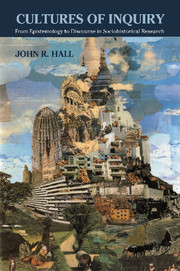Book contents
- Frontmatter
- Contents
- List of tables and figures
- Acknowledgments
- Prologue
- 1 Introduction: the Third Path
- PART I FORMATIVE DISCOURSES
- 2 Value discourse and the object of inquiry
- 3 Narrative cultures and inquiry
- 4 The conceptual possibilities of social theoretical discourse
- 5 The core of explanation and interpretation as formative discourse
- PART II PRACTICES OF INQUIRY
- Notes
- Bibliography
- Index
5 - The core of explanation and interpretation as formative discourse
Published online by Cambridge University Press: 22 September 2009
- Frontmatter
- Contents
- List of tables and figures
- Acknowledgments
- Prologue
- 1 Introduction: the Third Path
- PART I FORMATIVE DISCOURSES
- 2 Value discourse and the object of inquiry
- 3 Narrative cultures and inquiry
- 4 The conceptual possibilities of social theoretical discourse
- 5 The core of explanation and interpretation as formative discourse
- PART II PRACTICES OF INQUIRY
- Notes
- Bibliography
- Index
Summary
In the former Soviet Union, why did the putsch in 1991 to restore hardline communist power fail? Did the plotters miscalculate? Were they unwilling to use force? Had the communist state apparatus reached a point of no return? Did the responses of capitalist states give courage to opponents? These questions raise a more general one: what is an adequate account? This question, like the others, lacks a definitive answer. Because of differing resolutions of the value problem, controversy promises to persist over whether “strong” explanation ought to be the preferred form of an account or whether all accounts are interpretive (see table 2.1). Nor, for those who embrace explanation, is there any consensual answer to the question of how a good explanation can be distinguished from a bad one. Given the intractable character of such controversies, sociohistorical researchers often regard philosophical discussions as irrelevant. In particular, naturalistic logical empiricists resist philosophers’ attempts to prescribe standards of explanation. A good explanation, they argue, ought not be thrown out on grounds that philosophers are not able to account for it.
No matter how arcane the philosophers’ debates, there is a practical side to the matter. Empirical questions get asked, and accounts will address such questions, with or without the benefit of philosophy. But any survey of actual research will evidence profound divergences in approaches to explanation and interpretation.
- Type
- Chapter
- Information
- Cultures of InquiryFrom Epistemology to Discourse in Sociohistorical Research, pp. 150 - 166Publisher: Cambridge University PressPrint publication year: 1999



